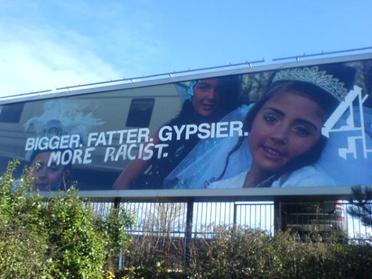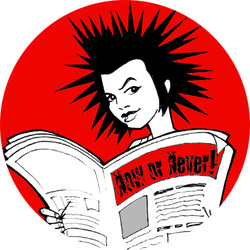
.
The TV show My Big Fat Gypsy Wedding goes part way to addressing some of the difficulties that gypsies face, or Irish travellers in fact. It presents a few of the slurs and backwards attitudes that society cast against them, but is also fairly guilty itself of reinforcing some engrained stereotypes. It seems to focus on certain members of the traveller community, predominantly the loud, brash ones, which is something that others in the community claim does not represent them adequately. The show also seems to excessively hone in on some of the more garish, lurid details of gypsy culture, taking what could be considered a condescending view of its quirky excesses. It looks down its nose at some of the subjects' antics, as if to say, "Ooh, look at that tasteless dress," or "Oh, isn't that cake in the shape of a castle so abominable?!" Because nobody in middle class suburbia would ever have anything like that at their weddings, would they? It point blank ignored the fact that tacky, tawdry excess is not the exclusive realm of the gypsies, and only certain ones screened by Channel 4 at that.
Down on Dale Farm, attention was brought to the travelling community there who faced eviction from the local council, who had not given them ample warning or a suitable place to move to after reasonable consultation, which is illegal practise in the UK under international law. For those who don't want to work on Maggie's Farm no more, life as a traveller has a rugged, rural appeal. The government have been curbing and curtailing freedoms of congregation and movement from the mid ’90s, with the Criminal Justice Act and abolition of the Caravan Sites Act that previously obliged local authorities to provide sites for travellers being notable examples. On top of that, automated number-plate recognition tracking devices and border control systems that track when you leave or enter the country have appeared in recent years. If it wants to be able to track everybody's movements, the gypsies, Roma and travellers are the ones to watch, as they are the most independent and furthest outside of the system.
Regarding the Dale Farm protest, it was reassuring that the voices heard coming from the local town were strangely tolerant and supportive of the Dale Farm travelling community. The nearby townspeople spoke well of them on a radio phone in that I heard, saying that they did not cause trouble or leave a mess, but were a welcome addition, bringing variety and enriching the culture of the area. Some bigots of course were heard to spout their usual perceived nonsense that gypsies caused crime, when statistics (the bane of bigots everywhere) show that the proportion of gypsies in prison is smaller than their proportion of the general population. The same mindless bigots, or perhaps other ones, we don’t want to tar all bigots with the same brush, can also be heard regularly criticising travellers for not working, but then when they do come round looking for work, they snub them for that as well. A pretty self-defeating attitude. In a survey conducted in Bulgaria, Czech Republic, Hungary, Romania and Slovakia, almost two-thirds of respondents said that they were refused work because they were Roma. This trend is worryingly similar across Europe, meaning that the only way that gypsies can get work is by their own means and wherewithal.
It is also repeatedly claimed that gypsies and travellers don't pay their taxes, but they do, like everybody does who buys anything or works in employment or are self-employed and pay council tax, unlike some of the large, tax-dodging companies with offshore accounts, who bigots seem perversely reticent to aim their accusatory fingers at.
Many travellers do not send their children to mainstream schools for fear that they will be picked on in this way, as well as having their traditional values and self-determination stripped away from them. The children of the Dale Farm camp had been able to enrol in the local primary school, as it was the first permanent place of residence they had stayed at, but faced humiliation and isolation when members of the settled community pulled their children out of the school shortly after. Youngsters from Dale Farm who attempted to attend the secondary school were marginalised, bullied and even physically attacked when their backgrounds were known.
That said, the situation in the UK is relatively fair in comparison to that on the continent. In Italy there is outright hostility towards the Roma people. In 2008 they were all forcibly fingerprinted by the government. In another stark incident in July 2008, sunbathers lay casually indifferent next to the covered bodies of two Roma girls who had drowned in the sea. Roma in Hungary were beset by shootings and Molotov cocktail attacks between January 2008 and August 2009, over 40separate incidents in total, resulting in seven deaths. In Slovakia there is segregation in schools to keep Roma children separate from the rest of the population as they are deemed a bad influence, and forced to attend either special ethnically segregated schools, or put into classes for children with “mild mental disabilities”, while in Germany and France, supposedly democratic countries, there have been mass deportations. One EU politician raised objections, recalling the continent's chilling past and previous terrors based on unfounded prejudices, but was shouted down by colleagues, such as Sarkosy, as being a troublemaker.
The band Gogol Bordello have led something of a rallying call to the creative, musical and artistic contributions of gypsies to Europe and the rest of the world (their travelling in previous times being one of the only ways that culture could spread). Balkan Beat Box, N.O.M.A. and Fanfare Ciocarlia have seen a resurgence of gypsy music bouncing around the dance-floors of Europe once more. As Eugene Hutz, lead singer of Gogol Bordello, puts it in the song Immigrant Punk:
"Of course we immigrants wanna sing all night long / Don't you know the singing salves the troubled soul? / So I'm relaxed, I'm just lurking around / I got a method and you don't / You got a dictionary kicking around? / Look up the immigrant, immigrant, immigrant punk!."
On a final note, the residents at Dale Farm still have to put up with abuse and threats. An anonymous letter was sent to the camp (whoever wrote it must have been very brave), stating they were, “trash”, “dirt”, and “filth”, with a closing remark, “Gypsies out.” The days of Enid Blyton have not passed

 RSS Feed
RSS Feed